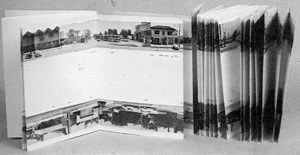Different Books as Art Objects....
- Get link
- X
- Other Apps
Adorn Decorate and Embellish - Book Art
"First they burn books, then people"
Nazi book-burning, Berlin, 1933
What is a book? Why do the two above images seem shocking and wrong?
Marina Warner 'Things - a spectrum of Photography 1850-2001'
A page from The Book of Kells 6th to 9th Century AD
The beautiful Book of Kells is a one off object with beautiful decorations made by hand. If you visit Trinity College in Dublin you can queue to view a copy of it, briefly, encased behind glass.
The facsimile copy of the Book of Kells inside a glass case, Trinity College, Dublin.
Modern books are rarely hand made since the invention of the printing press - they are mass produced objects (see the history of books here).
A book is just a material object made of paper, glue, string, material and cardboard. Do we fetishize books - seeing them as mystical objects? (read Geoff Dyer's article here and Julian Barnes article here).
Georgia Russell 'De Bauelaire au Surrealisme' 2007
The idea of the book as a mysterious, precious object is explored in the work of Georgia Russell. Russell shreds and dissects old books with a scalpel and presents them in glass cases like a scientific specimen. The shredded pages resemble hair with occasional letters spared so we can read certain words. Look here for more artists who cut up books.
'There is a simultaneous sense of loss and preservation in each work'
Georgia Russell
Is a book simply a Container for information - like a piece of paper, a record, a tape, a floppy disk or a hard disk drive.
Valerie Belin - Palettes
One of the great scandals of the modern age is "built in obsolescence". A product is no longer designed to be mended or maintained; the consumer is forced to throw it away. Valerie Belin's 'Palettes' series of photographs show how we discard modern technology easily - we don't attach the same value to these containers of information as we do to books. We don't store them and collect them - we dispose of them.
Maybe it is what a book represents.
In 1962 Joe Orton and Kenneth Halliwell were sentenced to six months in prison for defacing library books. They had cut up, collaged and juxtaposed battered library books together to create bizarre photomontages (see more examples here).
In 1962 you could be arrested for cutting up library books - it was an act of rebellion.
If the books used are not culturally significant is their destruction less shocking - as in these works made from cheap crime novels.
Thomas Allen has taken an old pulp fiction book and cut into the front cover - creating a three dimensional image. These mini sculptures are then rephotographed from a particular angle for added drama. In this above image one man punches another who then falls backwards. It has all the drama of a pulp novel or film noir. Allen has used a minimum depth of field to blur out the punching man and draw our eyes to the falling man. Are these works book art, sculpture or photography?
Rachel Whiteread "Sequel IV”, 2002, Plaster, polystyrene and steel
The Sculpture Rachel Whiteread gives physical form to the negative space around objects. In her piece 'Sequel IV' she has made a sculpture from the space around a book shelf.
Anselm Kiefer 'Barren Landscape' 1987- 1989
I went to the British Library in the Summer of 2011
and Everybody was on their laptops
In 2011 ebooks out sold Hardback books in Britain. By reading books on a mass produced screen it makes all novels, visually look alike. This has had a strange effect on book publishers - Books are becoming precious objects again.
"Books you will want to collect and share, admire and hold; books that celebrate the pure pleasure of reading"
Penguin English Library Series 'Readers Editions' press release vis 'Cover me Beatiful' artical in the Guardian.
Page from 'Bibliographic' showing 'Pioneers of Modern Typography' Herbert Spencer 1969
example of Orell Füssli's "schaubücher"
Ed Ruscha - 'Every building on sunset strip' 1966
Presenting Photographs in a sequence is common. You are guided around a gallery in a certain direction, coming across certain images first. A website or slide show on a computer screen is often designed to guide us through the images in order. Arguably the most natural and intimate was to experience photography is in a book. A book designed by photographers to be read in a certain way is know as a
- Get link
- X
- Other Apps























Comments
Post a Comment